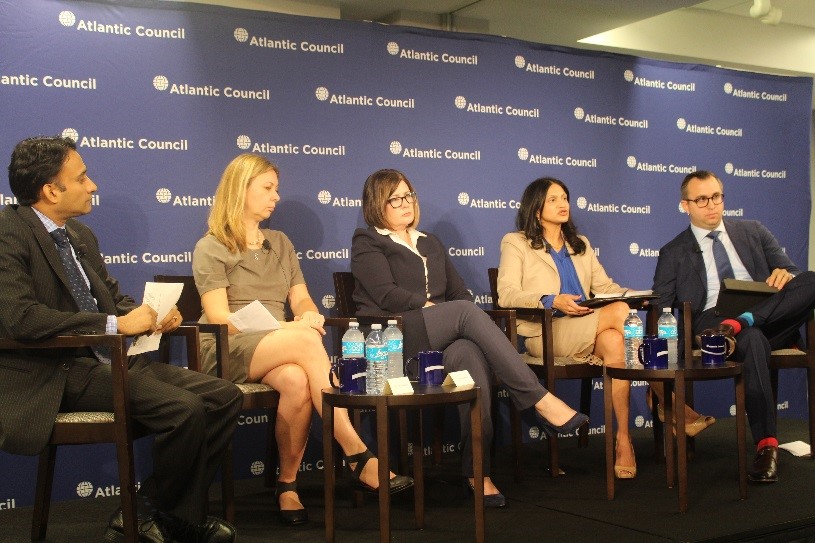
On October 3, The Atlantic Council’s Economic Sanctions Initiative held a two-paneled public event entitled: Economic Sanctions After Brexit: What Roles Should the Public and Private Sector Play?
The event was possible through the generous support of Hogan Lovells US LLP, PricewaterhouseCoopers US LLP and The Hon. David D Aufhauser. The Georgetown Institute of International Economic Law co-organized the event. A private lunch followed the public discussion.
David D. Aufhauser opened the dicussion by stressing the importance of economic sanctions to national security. As the General Counsel of the United States Treasury Department, Mr. Aufhauser saw first-hand the development of sanctions as a foreign policy tool in the post 9/11 era. In what became a running theme throughout the event, Mr. Aufhauser emphasized the importance of public and private-sector cooperation and the need for sanctions to be multilateral in order to be effective.
The keynote speech was delivered by Ambassador Daniel Fried, whose experience and role in implementing the Russian sanctions was lauded by all speakers. Ambassador Fried highlighted that the Trump administration has indeed maintained some elements of continuity with regards to sanctions on North Korean. Ambassador Fried additionally emphasized how in the case of Russia, the key to effective sanctions was deep coordination, consultation and trust with the European Union, even before the sanctions were implemented.
The first panel discussion “Sanctions development, implementation, and enforcement after Brexit.” focused on the public-sector and included Director of the Office of Foreign Assets Control (US), John Smith, and the Deputy Head of the Office of Financial Sanctions Implementation (UK), David McLean.
David McLean spoke about how the UK will need to form its own independent sanctions institution outside of the EU once Brexit is complete. He emphasized that the UK government has already publicly stated it will continue to implement the sanctions agreed upon with the EU after Brexit, and a new sanctions bill will become a part of the UK’s legislative agenda. David McLean reiterated that the UK will continue to be a reliable international partner after Brexit.
John Smith’s opening statement was a strong advocacy for continued international cooperation and private-sector engagement in the economic sanctions arena. With continued international uncertainties, John Smith mentioned Russia, North Korea and Venezuela as complex issues that require nuanced international responses. He also pointed out the role of the UK as a primary driver within the EU in promoting economic sanctions. There was an agreement amongst guests that there will need to be an alternative member of the EU to come forward and become the EU’s vocal figurehead of sanctions.
The second panel discussion focused on the private-sector, featuring Dorothy Bennett, Global Sanctions Director from JPMorgan Chase; Kathleen Palma, Senior Executive, International Trade Compliance; Neena Shenai, Principal Global trade Counsel, Medtronic; and Daniel Tannebaum, Global Financial Services Sanctions leader at PricewaterhouseCoopers USA. The title of the panel was: “How can the private sector prepare for, and contribute to, the post-Brexit sanctions landscape.”
Participants emphasized primarily the uncertainty that Brexit could create. Many pointed to the many facets where uncertainty can be seen, be it UK-EU, US-EU or UK domestically. An issue that was given in the context of Brexit was the significant impact it would have on all firms, and their inability to necessarily concentrate on all consequences – such as sanctions, for instance.
Other private-sector members also encouraged the UK to make sure it continues to listen to business interests. In the creation of its independent sanctions authority, it should seek to speak to the private-sector to make sure there is harmonization in enforcement and organizations can comply more easily. Private-sector outreach was considered critical by all panelists, and was encouraged not only from a UK perspective but also the US and the EU to continue. If the UK were to change its sanctions policy, the need for guidance and notice was seen as paramount.